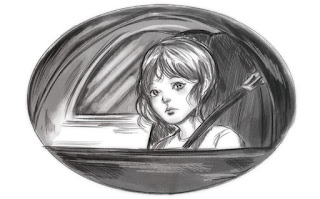.jpg) |
| Do you have all the time you want to write? |
I don't. The first thing I want to do when I get up in the morning is write. But there are so many other things to do. Often, I don't sit down to do it until nighttime when the dishes are done and the house is quiet.
Throughout my day I dream
of having (in order of preference):
·
a nanny (if I still had kids at home)
·
a maid
·
a cook
·
a secretary
·
a research assistant
·
a dedicated media specialist
·
an errand runner
·
a personal trainer
·
a gardener
·
a dog walker
Make Your Life Your Inspiration
An excellent humorist writer friend of mine once told me about challenges her husband faced at his job. About what was going on with each of her three sons. About her own life and lack of time to get everything done.
But, she said, I wouldn't trade my life for anything. If it weren't for the angst in my family, I wouldn't have anything to write about.
I've never forgotten her
insight. It's a lesson I cherish every day. If I had too much time to write, my
need wouldn't be as urgent. I may not be as motivated. I may not have those few
hours of pure bliss to look forward to each day.
Once I did nothing but
write. My life became so narrow, it sapped any energy I had once had for my
writing projects and soon I ran out of ideas. My page was as blank as my life.
Create a proper balance in your life and this effort will take care of
everything. What if balance isn't possible? Lopsided is good. As long as you
take time out each week to work on your writing projects. Though it sometimes
seems impossible, eventually you will finish and go after publishing your work.
Gains and Losses
Since
recently finishing my first book, I realize I am teetering on the brink of
publishing and marketing it and jumping into my next writing project(s) with
both feet. Here is the short version of what has happened to my time while
writing the book and a scenario that is sure to continue as I endeavor to reach
my future writing goals.
Gains:
·
The many friends and acquaintances I've made that will surely
remain a part of my future.
·
The sharpening of my skills.
·
Learning many new things every day.
·
Staying up late and still getting up early.
·
Enjoying the feeling of joy inside at all that
writing has given me.
·
The fun it is to share with others.
·
The feeling of accomplishment at completing such a
challenging task as writing a book.
·
Looking forward to writing more books, articles
and stories.
·
Keeping other interests alive to strive for less
lopsidedness and more balance, especially spending time with my family.
·
How much I've grown from reading and learning
about different people and subjects, and then the growth that has taken place
from writing about them.
·
Emotionally I feel I've grown, too, for it seems
that understanding our own emotions and others' emotions is part of writing.
·
Being an entertainer.
·
The sheer fun of having an audience!
Losses:
·
Little time for other hobbies, though I squeeze
them in when possible.
·
Little time for socializing; having to say no to
invitations to join clubs, play bridge, loll around the pool . . .
·
Miniscule free time to simply curl up with a good
book or watch TV, or do nothing.
·
Everything I do has to have a purpose in order to squeak
out time to write.
Live a Life of Gratitude
The list of gains is long, losses is short. Good! Like my
humorist friend, I wouldn't trade this life for anything. Let us be grateful
for the lives we've been given, which have brought us so willingly to the page
over and over again.
Illustration: Courtesy of vectorstock.com
Linda Wilson writes stories for young children. Visit Linda at https://bit.ly/3AOM98L. Click the links for free coloring pages and a puppet show starring Thistletoe Q. Packrat. While you’re there, get all the latest news by signing up for Linda’s newsletter.
Find Linda’s books at Amazon Author Page.
Connect with Linda: Facebook, Twitter, Pinterest, Instagram
 |
| Secret in the Mist: An Abi Wunder Mystery, Book Two in the series, is coming soon! |
.JPG)







